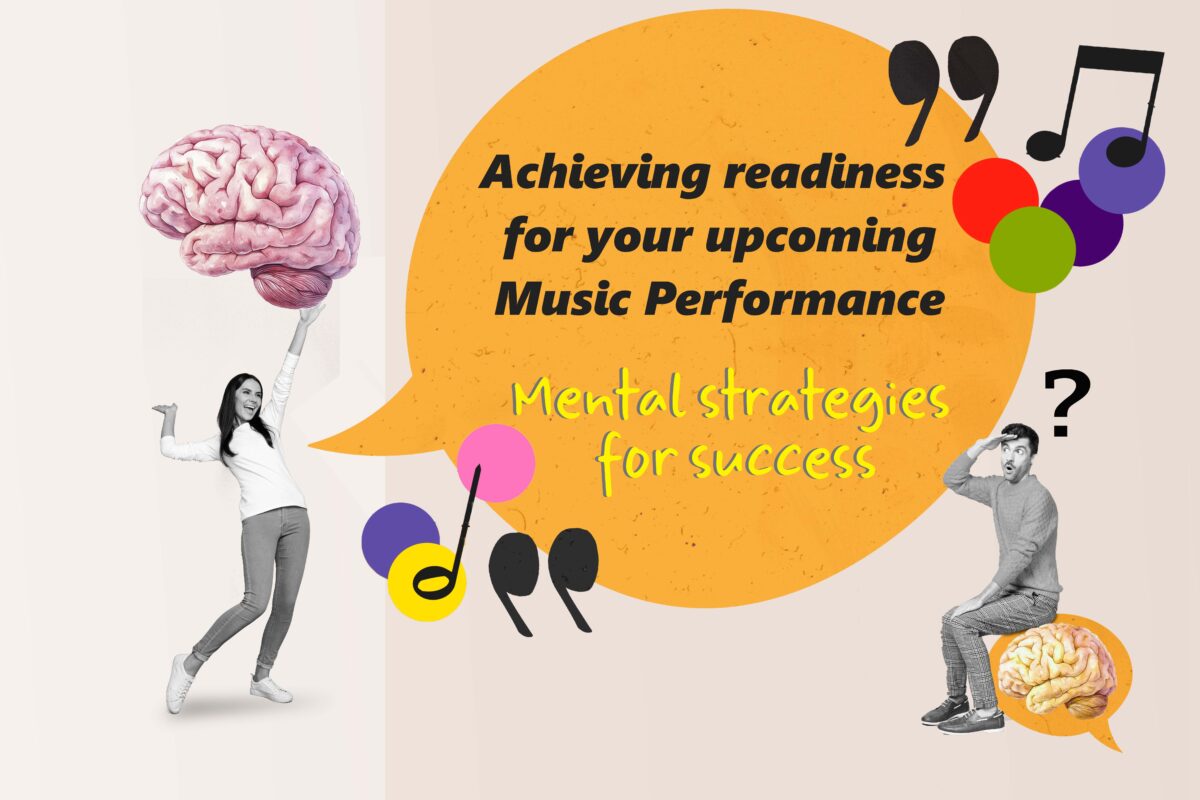Mental Strategies for Success in Musical Performance

Your exam day is approaching and you have undertaken many hours of preparation on your music to this point. Congratulations on the work you have done so far!
Much of your performance preparation to this point, has been of a practical nature; attending lessons, learning music and ensuring your instrument and your reeds are ready. An element that is often overlooked is your mental preparation!
Your brain is a powerful tool. It is flexible and imaginative. You can shape your performance and your reactions in ways that you may never have imagined. Like anything, your brain needs to practice not just the music, but reacting to the performance situation. A performer who has achieved successful mental preparation is ready to overcome unexpected obstacles on the day of their exam and has a higher chance of success!
Mindset
It is a great idea to approach your performance preparation with curiosity and self-compassion. Progress on your woodwind instrument can be slow and demanding, however, you may not realise how much you are improving with every focused practice, every lesson and every positive thought. Adopt a positive and reflective mindset and you will be prepared for growth, both in your practical playing and your emotional and mental preparation.
Your brain needs feeding! And at this moment, just prior to your upcoming performance, you are feeding it well! It is learning and refining the mechanics of playing your instrument and mastering your music. Now is also the time to feed your brain positive language, positive strategies and successful thoughts to achieve your best mental strategies for success on your performance day!
Keep a practice journal to track your goals, challenges, thoughts and achievements. A journal can be a good way to reflect on your learning, and this will build resilience and provide motivation. Some elite sportspeople and performers use journaling to relax before their event or record details that they may forget afterwards. Journaling also helps focus your mental energies and can keep the mind free and uncluttered.
Manage Nerves and Develop Mental Resilience
Performance anxiety is natural, and it can be managed with the right techniques.
Performance anxiety is often referred to as “Activation”. Activation, anxiety or performance stress refers to how it feels to have the flight/fight or freeze response created by an upcoming performance.
What Causes Anxiety?
Your brain responds to stressful situations by noticing that an important event is occurring, or about to occur. The brain’s reaction is to flood your body with natural chemicals. These chemicals (neurotransmitters) create bodily changes to help you prepare and react to the important event. This is an effective survival mechanism for when we see danger, but sometimes being prepared for danger doesn’t help you perform at your best!
In the case of your exam or an audition performance, your brain triggers an internal response that is designed to compel you to run away at super-human speed, or stand and fight, or freeze in place like a statue, incapable of movement! You may feel nauseous or breathless, have shaking hands or a dry mouth. You may have slower mental and physical responses. You may even forget important things, like how to read music! These reactions are unhelpful when you are about to perform. Sometimes the neurotransmitter responses in your body create symptoms that are unhelpful to achieving a great exam performance.
Part of your preparation is to learn how you react in these situations. How does your brain register what is happening? And how does it respond? How does that feel within your body? Did your tummy feel sick? Were you having trouble breathing? Did you feel like you might have a heart attack? Did your brain stop working normally? When these things happen, it feels like your body and mind are working against the one thing you really want to achieve and do well at!
If any of these reactions sound true for you, now is a great time to employ a positive mindset and work on strategies to reduce the impact of these consequences.
How to find your Optimum Performance Activation Level
If you think of activation on a scale where the lower numbers on the scale represent low levels of activation, akin to being in a relaxed, chilled state, and higher numbers represent higher levels of stress, akin to freaking out; your task as a performer is to learn the activation level that is perfect for you.
Figure 1: Where is your Optimum Activation Level for Best Performance?

Your task is to find your optimum level of performance readiness. What state do you need to be in to perform at your best?
If you perform best when you are really excited and fizzing with nerves, you’ll have a higher number on the activation scale and you will welcome feeling highly activated! You’ll be focused prior to your performance on creating this level of energy from within. You might listen to uplifting music, you might sing or dance to create the energy needed. In your pre-exam preparation you will have practiced a range of techniques to help prepare with this in mind.
However if you perform best when you are more relaxed and feeling calm inside, you’ll have given yourself a lower number on the activation scale. You’ll be looking for ways to bring your energy down prior to performing. You might use strategies such as mindful meditation using deep breaths to bring your focus to the task. Or you might find a quiet spot away from others to prepare gently for your performance.
How do you learn what your ideal activation level might be? By performing of course! But you can also learn a lot from your thought processes prior to a performance. Also visualising yourself in the performance will give you an idea of how your body might react in that situation.
Use your practice performances to document how you felt before your mock performance and compare that to how well you played. Undertake situations where you are under performance pressure and see how you react in each situation. Document your thoughts at the time. Were they helpful or unhelpful to your performance? What physical experiences did you have in your body? Sweaty hands? Breathlessness? It can help to write these observations down.
Record your practice sessions, accompanist sessions and practice performances. Listen back so you can be your own scientist. Analysing what you did well and what didn’t go well is helpful to finding solutions and or doing more of what resulted in great moments! Analysis and problem solving go hand in hand to determine the mental strategies for success for your exam performance.
Strategies to Achieve the Perfect Activation Level for Optimum Performance
Now that you know the activation level that works best for you, you may find practicing these strategies helpful to increase or decrease your energy before your performance:
Mindful breathing:
Incorporate slow, deep breathing into your daily practice. Before playing, inhale through the nose, hold briefly, and exhale steadily. This calms anxiety but also strengthens breath control for tone production. With practice you will become very good at using mindful breathing to either increase or decrease your energy to the desired level. In a short time, you will be able to use mindful breathing to attain the perfect activation level in as little as three breaths! If you are unsure about the practice of breathing or mindfulness there are resources to help. You could consider having one-on-one coaching on specific tailored strategies for your upcoming performance! Many musicians have successfully employed qualified coaches to succeed at extremely challenging of performances with astounding results. If you would like to know more, check the additional resources section at the conclusion of this article.
Visualization:
Mentally rehearse your exam from start to finish—imagine walking into the room, greeting the examiner, and playing confidently. Visualization builds familiarity and reduces uncertainty. You will practice visualising your desired energy level as part of this process. This visualisation will make it easier for you to achieve that state on the day of your performance.
Positive self-talk:
Replace thoughts like “I’ll make a mistake” with “I am prepared and capable.” Confidence comes from repetition and reinforcement of positive beliefs. Your mind is powerful and also mailable. Tell your mind what you want it to achieve. Where these results are within your control, your amazing brain will help you get results. Positive self-talk works best with a combination of aspirational phrases and practical phrases. Aspirational phrases include as “I trust myself” and “I can do this”. Practical phrases include self-advice like “greater breath support for the high note”.
Accept imperfection:
Even the best performers make mistakes. What matters is recovery and musical communication. Train yourself to continue playing gracefully after errors instead of dwelling on them. Instead of focussing on errors, focus on the areas in your performance that may not go perfectly. Then work on strategies with your teacher to recover quickly and get back on track. Accepting imperfection is a skill you may need to practice!
Rest and recovery:
Mental fatigue can impair concentration. Schedule breaks during practice sessions, get sufficient sleep, and engage in relaxing activities to keep your mind fresh. In the days leading up to the exam, ensure you get enough rest, eat well, and avoid over-practicing. You can swap half of your physical practice time for mental practice. Mental Practice has the same effects but with less fatigue on your body prior to the event. On the day itself, arrive early and warm up gently. Remind yourself that the exam is an opportunity to share your music, not a test of perfection. Trust in yourself and your work to this point. Allow yourself to do what you have trained to do over the preceding months and years.
The value of self recording
Recording yourself regularly provides honest feedback, helping you identify subtle issues in timing, tuning, or tone. It also allows you to track your progress over time—an excellent motivator during long preparation periods. If you have been recording your practice sessions, you’ll have realised that small errors are often barely noticeable. This will help you with the previous point “accepting imperfection”.
Consistency is key to success and regular correct practice will reinforce pathways and associations in your brain. The more you reinforce the correct mental pathways by practice, the greater your likelihood of performing successfully under pressure.
A Growth Mindset: Reflect, Learn, and Progress
Every exam, whether successful or challenging, contributes to your growth as a musician. Alongside your self-recordings and mindful practice, keep a journal to record your goals, breakthroughs, and frustrations. Reflecting on your journey builds resilience and helps identify patterns in your learning.
Remember: improvement is gradual but rewarding. Celebrate small victories as these accumulate into mastery. Such as smoother transitions, better intonation, longer breath support. This exam or performance is another step along the path of your musical journey. But it won’t be your last! Go forward with all that being a musician gives you and enjoy!
Further Resources
Green, Barry. The Inner Game of Music. Knopf Doubleday Publising Group. 1986
Greene, Don Ph.D. Performance Success. Performing your best Under Pressure. Routledge, 2002
Buswell, David. Performance Strategies for Musicians. MX Publishing, 2006
Interested in private tuition to assist you to achieve peak musical performance? Mark Shiell, experienced musician, conductor, and mindful meditation specialist. Helping Musicians find mental clarity to perform their best.
Shiell, Mark, Aussie Meditation. One -on-one coaching for musicians and performers. www.aussiemeditation.com.au
